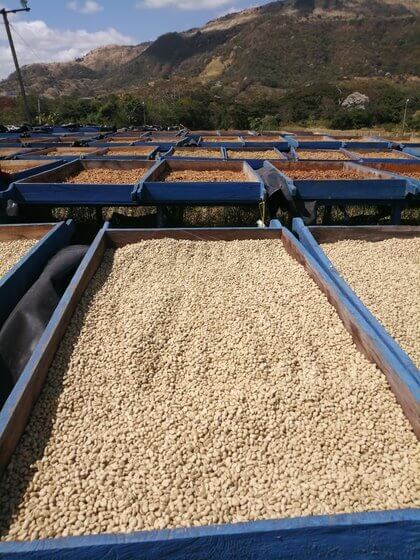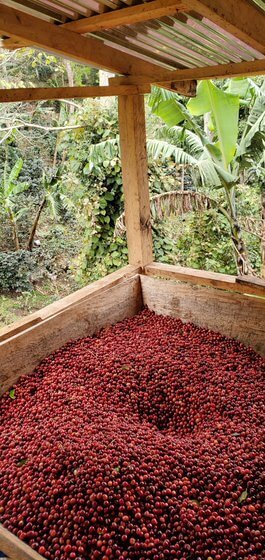Highlighting the coffee Farmers today
We know the 4th wave coffee is here or is very close because we see a push for more organic coffee, sourcing coffee beans from individual farmers, and sourcing the highest quality coffee. We also see not only fair trade coffee but investment in the farmer to build for a sustainable future. A mutual partnership with the farmer to the coffee roaster or barista (“Crop to Cup” method) is becoming much easier to accomplish than ever before. We can now talk to our farmers directly in Guatemala via Zoom or Instagram. The transparency has never been better when you can chat personally with the farmer. We recently started to work directly with the farmers. After all, they do the majority of the work and the coffee roaster or barista gets all the credit.
Direct trade coffee vs. Fair Trade coffee

Fair Trade coffee began in the late 80’s when supply of coffee exceeded demand. Some organizations banded together to create the Fairtrade International to stabilize the market place. It prohibits forced labor and child labor and the farmer is given a fair price. That phrase is in bold because there are skeptics out there on fair trade. It’s considered ethical consumerism and not advancing the coffee industry. Transparency is often questioned because you have many players involved before the coffee gets to the coffee roaster. First, the farmer needs to be certified under the fair trade label. Importers and exporters are involved in the process with their fees. The importers have to pay a minimum price to the exporters to ensure the producers are getting a fair wage. Not all deals are profitable for the exporter, especially fair trade coffee. This entire process eventually hurts the farmer in the long run. Direct trade in coffee is when a coffee roaster buys coffee directly from a producer It cuts out or uses less of the middlemen and additional fees that separates the farmer from the roaster. Coffee roasters are more willing to travel to a farmer’s country to form relationships.
Direct trade has many benefits

1- Better wages – With less middlemen and fees, the farmer pockets more money and gives them more investment opportunity. The farmer has enough income to provide for the year but also has enough to invest into next year. It gives the coffee farmer income to invest in agricultural equipment and the well being of the farmer. As we will discuss later about the relationship benefit, the farmer could ask for a higher price from other buyers because they gain more insight and expertise of their product
2- Sustainability – Minimizing less water and the use of better crop management. Reusing the coffee bean waste for fuel or fertilizer. With more resources and funds they can plant more biodiversity alternative crops such as banana trees and create an environment for bees, birds and other animals who are part of the ecosystem. If a farmer can grow tall trees within the coffee plants it can promote a more balanced ecosystem by providing shade. A healthy ecosystem can use less or no chemical pesticides and insecticides because it naturally defends off crop destroying insects.
3- Relationships – Between the coffee roaster and farmer is much more of an open conversation. There is more flexibility on the farmers to experiment with crops to improve better rounded coffee crops. The relationships can further the development in infrastructure because the farmer has confidence in the coffee roaster purchasing the green coffee beans every year. In return, the coffee roaster can provide better insight of the quality of the coffee and provide feedback from his customers to the farmer. Rather in a non-direct trade, the farmer takes his coffee to a marketplace where they have less feedback and insight of their coffee because they don’t know who is buying their coffee.
4- Social Sustainability – If a farmer can estimate how much his crop is worth every year they can prepare better for the future. Unstable coffee prices create uncertainty for long term investments. If a farmer wants to provide housing, health care, education,
and better quality of life for them and their employees then they need stability. Direct trade can help promote Social Sustainability from minimizing unstable coffee prices. What better investment in someone’s future than education itself. Direct trade coffee can have a ripple effect by lifting people out of poverty with education programs, living longer and healthier, and boost economic development.
Few disadvantages of direct trade

Language and distance with the buyer-farmer can have a language barrier that can be a challenge when working with a coffee roaster. One of the parties can be easily misunderstood which can cause discrepancies. Adding to that, distance being a factor can create doubt among each other if the coffee isn’t satisfactory. Coffee roasters may have to travel extensively to the farmer to see the operation. Especially starting out as an independent farmer language and distance work against you because who do you know that’s going to buy your coffee throughout the world? There is hope with social media because several farmers are taking their business on those platforms. At Banyan Coffee we meet several farmers on social media outlets. Farmers getting into cupping competitions will gain attention Risk of unsold coffee lots – If the coffee isn’t up to par with the coffee roaster’s expectations then the coffee must be sold elsewhere. If there are no buyers then the farmer may have to sell it at a market for less than his or her initial investment.
San Miguel’s coffee

Falla family is one of the oldest coffee farming families in Antigua. They produce one of our finest coffee offerings. The San Sabastian from Guatemala is a Pacamara variety that has a super fruity coffee taste. It’s a natural process which gives it that fruit coffee profile. The farm has several programs to ensure a sustainable model. With water usage being high in the wet-milling process, the farm created reabsorption wells connected to its water-efficient mill. The wells allow water used for wet milling to sit for three days for the sediment to fall to the bottom of the wells and be removed. This prevents waste-water runoff that can be hazardous for the environment and for people. They mix coffee pulp and dirt for the worms and resulting compost that nourish all the plants on the farm. The extra compost is sold to local farmers. They also reuse their parchment (we talk about parchment in our blog “What is Coffee” linked here). Once it has been removed from the beans, the parchment is stored and used as fuel for the farm’s machine dryers. In addition to caring for the environment, the farm takes care of its coffee farmers. It has a health clinic that treats more than 4,000 patients annually.
La Bendición Farm (Nicaragua)

We love this coffee because it has a peach candy taste. This washed process coffee doesn’t come easy. Ana Carolina is the farmer of La Bendición farm. She produces a 100% Red Catuai variety. She travels extensively to a 2-hour journey down the mountain to the dry mill. The entire farm is depulped by a hand crank. Ana Carolina hopes to build a new wet mill in the near future and to continue improving her farms yield with support from Gold Mountain. At Banyan Coffee Roasters, one of our near-term goals is to start visiting the farmers that we work directly with. Bridging the gapsand creating a better relationship with our farmers will trickly down to the coffee consumer. When we source ethical coffee, everyone wins. Better wages and stability to the farmer, coffee roaster works with a better product and the Bradenton and Sarasota coffee shop produces a better cup of coffee to the customer.
